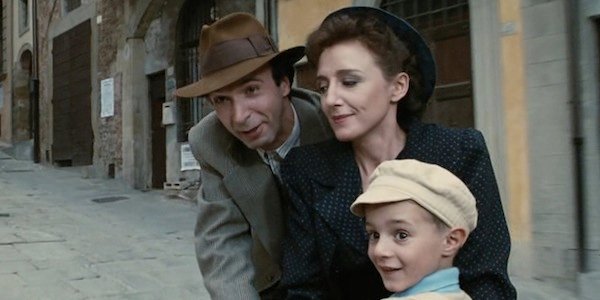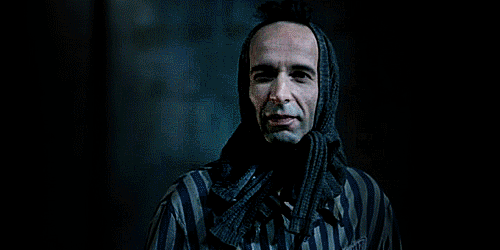* Worthy example of how to overcome adversity *
Life is beautiful is probably the most recognized and acclaimed Italian film internationally. The script, the soundtrack and the interpretations of the actors make it an unforgettable film, capable of going from laughter to tears and transmitting an infinity of emotions. In short, a masterpiece of cinema loaded with messages, directed and starring Roberto Benigni in 1997.
This film is inspired by the work Alla fine ho sconfitto Hitler by Rubino Romeo Salmoni, an Auschwitz survivor who narrates his experience in that book. The film is about the story of Guido Orefice, a Jewish-Italian who moves to Arezzo to work at his uncle's hotel. Soon, he will run into Dora, a teacher from a wealthy family akin to the fascist regime. Guido will do everything possible to conquer Dora, he always appears unexpectedly and will try to surprise her in all possible ways.
Finally, the love between both triumphs, and they will have a son, Giosuè; Guido seems to smile at life. However, World War II will cause his whole life to fall apart and end up in a concentration camp.
Life is beautiful, it takes us to an Italy submerged in fascism and leads us to the horrors of the concentration camps. He does it in a different way, he presents this story to us as a kind of tale with a bittersweet ending.
"This is a simple story, but it is not easy to tell. As in a fable, there is pain, and like a fable, it is full of wonders and happiness ",
-Giosuè, Life is beautiful-
Life is beautiful, from the comic to the tragic
Life is beautiful begins in a cheerful, funny and funny tone; In fact, because of his first scenes, we can hardly guess that we are facing a drama, although we did see the rise of fascism in Italy from the beginning.
The comedy in Life is beautiful we find in small details, in small moments that lead to a comic wink. However, what is really interesting is how an unpleasant and spooky situation manages to get us a smile.
The fascist ideology that prevailed at that time caused that in 1938 the Manifesto of the race was published, text signed by Italian scientists who endorsed the existence of human races. These races were divided into small and large races, where the aria was, of course, the big race. A pure Italian race. These ideas together with the fascist racial laws were explained in the schools and, thus, the children would avoid getting together with Jews so as not to alter their "purity".
Is it possible for a Jew to flout these racial laws? Is it possible for a Jew to dismantle a whole fascist theory at a time before a group of children? Yes, it is, at least, in Life is beautiful.
Guido pretends to be an inspector of the ministry who must offer a talk to the children about the Manifesto of the race. Actually, Guido wants to get Dora's attention, but what the scene shows is that we are all the same.
Guido points his navel like an authentic Italian navel, his ears, etc. Children, when they see it, imitate it and laugh. In this way, Guido manages to demystify those differences to which the manifesto appeals, since he is Jewish and does not present any physical characteristic that distinguishes him from those "purely Aryan" Italian children.
This scene, without doubt, brings us all a smile, but it is a bittersweet smile if we consider the true meaning of that talk, which meant for those children to hear a gentleman from the ministry to talk to them about human races.
Guido mocks all those beliefs, dismantles all racist ideology with witty and funny comments. It is a character that conquers us from the beginning, is carefree, very creative and his fight to conquer Dora fascinates us. Nothing stops it, not even fascism.
The life of Guido and his family is truncated by the Holocaust, Guido leaves with his son and uncle to a concentration camp. Dora, being Italian and not Jewish, is not obliged to go, but decides to leave voluntarily to try to be with her family.
From this moment, the film takes a radical turn, the cheerful and carefree tone walks towards tragedy. But Guido does not lose the smile for a moment, always tries to fight for his survival and that of his family and begins to invent a story that will avoid the suffering of the little Giosuè.
The struggle and sacrifice of Guido
A phrase, a belief or an idea can make the world of a person change completely, that our way of seeing life is transformed and that everything makes sense. Ferruccio, a friend of Guido, tells him at the beginning of the film that according to Schopenhauer "with the will you can do everything". This phrase will mark Guido forever. At first, he will use it comically, but over time, we realize that it will be his way of life.
Guido has a purpose, he wants to survive, but, above all, he wants his son to do it. He will fight to the end, trying to keep his son from ever losing his smile, from being happy in hell. He will sacrifice his own security so that his son does not see the horrors of the concentration camp, he will do everything possible to find Dora and send him signals so that he knows they are still alive.
Guido is an example of struggle and overcoming adversity. Your great imagination and will will create a false reality so that your child is not aware of what they are living. It will make you believe that everything is a game, that they are free and can leave when they want, but if they endure and manage to win a thousand points, they will have their reward. On the other hand, Giosuè has always dreamed of having a tank of truth, for that reason, Guido will make him believe that the prize will be that and, in this way, he creates in Giosuè a will to live.
Guido does not know if they will survive, he does not know how long they should remain in the field, but his eagerness to survive is stronger than any uncertainty. Do not let your child see you devastated, sad or not wanting to live. Life is beautiful shows us that happiness, sometimes, is in our way of looking at life, to accept and face adversity.
Despite the great extermination that took place in the concentration camps, there were also survivors, people who managed to face torture, hunger and injustice. An example of this is the psychiatrist Viktor Frankl who, after his survival in a concentration camp, published The Man in Search of Meaning. Work in which he exposes his experience and quotes a famous Nietzsche phrase that can summarize very well the argument of Life is beautiful: "who has a reason to live can face all the hows".
Life is beautiful is an example of overcoming, makes us see beauty in horror and freedom even where there is none, makes us laugh and cry ... Guido had a reason, a will and managed to create that feeling in his son. In this way, despite the rawness of the film, we could say that his struggle and his effort paid off.





really Excellent Movie! it teachs you a lot of things!
Interesting, interesting, provocative and insightful. I have learned from your commentaries. This writing has motivated me to see this film. Thanks
This film is very good because it gives a good message, that despite the adversity, we have to be happy and as the title says "life is beautiful"
Congratulations! Your post has been selected as a daily Steemit truffle! It is listed on rank 1 of all contributions awarded today. You can find the TOP DAILY TRUFFLE PICKS HERE.
I upvoted your contribution because to my mind your post is at least 15 SBD worth and should receive 94 votes. It's now up to the lovely Steemit community to make this come true.
I am
TrufflePig, an Artificial Intelligence Bot that helps minnows and content curators using Machine Learning. If you are curious how I select content, you can find an explanation here!Have a nice day and sincerely yours,

TrufflePig